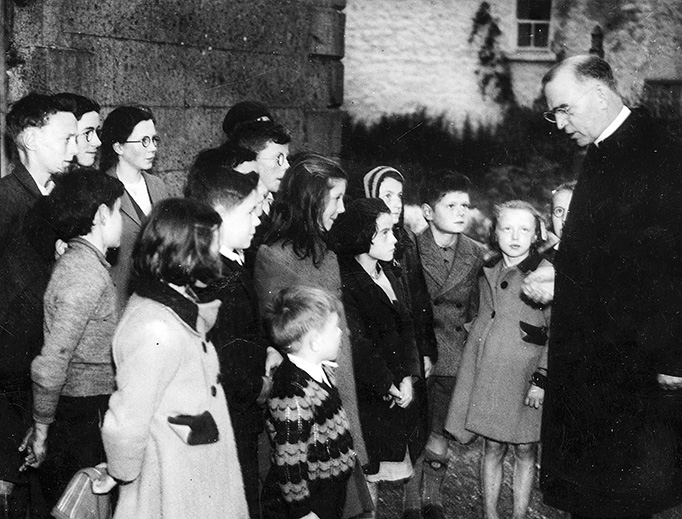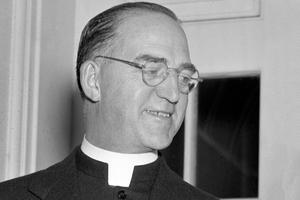Father Flanagan Is an Intercessor for Our Times
Father Flanagan dedicated his life to ministering to broken children.

I recently found a hero to help heal our cultural wounds. I am appealing to Father Edward Flanagan, the Irish American founder of Boys Town, to pray for us.
With my Irish Catholic heritage, social work degree, and past experience running a group home for delinquent teenage boys, I should have made his acquaintance years ago.
Although I had heard of him, I only came to know about him recently through a magazine article assignment and after reading his biography, Legacy of Devotion, written by 93-year-old Father Clifford Stevens, who lived at Boys Town while Father Flanagan was still there.
Father Flanagan dedicated his life to ministering to the outcome of broken families: broken children. He cared for boys of every race, ignoring even death threats when integration did not sit well with everyone. He saw only souls, not color. Father Flanagan began by finding boys living on the streets in the early 1900s, giving them a home and a new life. In 1979, the mission eventually extended to girls and continues to help whole families to this day.
History
Father Flanagan was born on July 13, 1886, in a thatched-roof cottage, the eighth of 11 children in a hard-working Irish farm family. He emigrated to the U.S. in 1904 and was ordained a priest in 1912 in Omaha, where his older brother Patrick was also a priest.
Tom Lynch, director of Community Programs at Boys Town and also director of their Hall of History Museum, explained the story to me in an interview.
“Father Flanagan opened a shelter for men living on the streets and called it a working men’s hotel. Over time, as men started showing up with drug and alcohol and mental problems, Father Flanagan noted their common denominator: broken families, no education and no skills. It inspired him to seek out homeless boys living in junk yards, railroad yards, and even prisons and offer them a better life.
“He went to a Jewish friend and borrowed $90 to rent his first home in 1917. It was an old mansion that had been converted to a boarding house. In two weeks, he had seventy boys. By 1920 he needed a bigger facility to house them. A priest with a crowd of homeless boys of different races and religions was not especially welcomed in neighborhoods. Father Flanagan rented another building for a while until he was able to buy the Overlook Farm, around 10 miles west of Omaha.
“The property was beautiful with orchards and crops in the field, and a lake for swimming and fishing. Father Flanagan announced: ‘We are free and independent. We will build our own village.’”
The village soon expanded to over 1,000 acres. At the public school, some boys were discriminated against and on average, were about three years behind, so Father Flanagan started a school for them. He created individual learning programs and also taught them trades. Church on Sunday was mandatory, but the denomination was of their own choosing. Father Flanagan had said, ‘Every boy must learn to pray; how he prays is up to him.’”
Abuse in Ireland
While the boys flourished under Father Flanagan’s supervision, in 1946, he received letters from Ireland begging him to investigate religious-run industrial schools that served poor and homeless children and unwed mothers. He arrived unannounced and was shocked.
Father Flanagan wrote letters to key people and spoke to a reporter in the U.S. calling the institutions a disgrace where children were treated harshly and abused. The Irish government was furious and denounced him in the Irish parliament. Undeterred, Father Flanagan vowed to return to clean things up. However, after World War II, President Truman asked him to assist governments with programs for war orphans in Japan, Korea, the Philippines, Austria and Germany.
Father Flanagan complied with the president’s request in 1947-1948. He was still planning to return to Ireland but died of a heart attack in Berlin on May 15, 1948. Sadly, it would be another four decades before the truth in Ireland became public. Beginning in the 1990s, a series of criminal cases and government enquiries established that hundreds of priests had abused thousands of children over decades. If only Irish officials had listened to Father Flanagan.
Cause for Canonization
Steve Wolf is a 1980 graduate of Boys Town and now a husband and father of five girls. He is a member of the Boys Town alumni group that helped open the cause for Father Flanagan’s canonization in 1999 and is the president of the Father Flanagan League Society of Devotion and vice-postulator of the cause. Wolf lived at Boys Town as a 14-year-old runaway from a single-parent home and graduated from high school there. He earned a degree in journalism and master’s in public administration and just retired from the Army National Guard after 38 years.
Wolf explained that in May 2017, Father Flanagan’s cause received a decree of judicial validity by the Vatican’s Congregation for Saints’ Causes. If it is determined that “Servant of God” Father Flanagan lived a life of heroic virtue, he will advance to the status of “venerable.” Generally, a miracle credited to his intercession will be required for beatification, and a second miracle for canonization.
Speaking of Boys Town he said, “When I talk to other alumni, every single one of us calls that place home. The essential ingredient is love. For that ingredient to be there for everyone, that’s God’s love and that’s what ties us all together. Father Flanagan would say, ‘It’s not my work, it’s God’s work.’”
For more information about Father Flanagan, to download prayers, or to plan a pilgrimage with Mass and a visit to his tomb, go here.
- Keywords:
- boys town
- father clifford stevens
- father edward flanagan
- ireland industrial schools
- steve wolf
- tom lynch


















